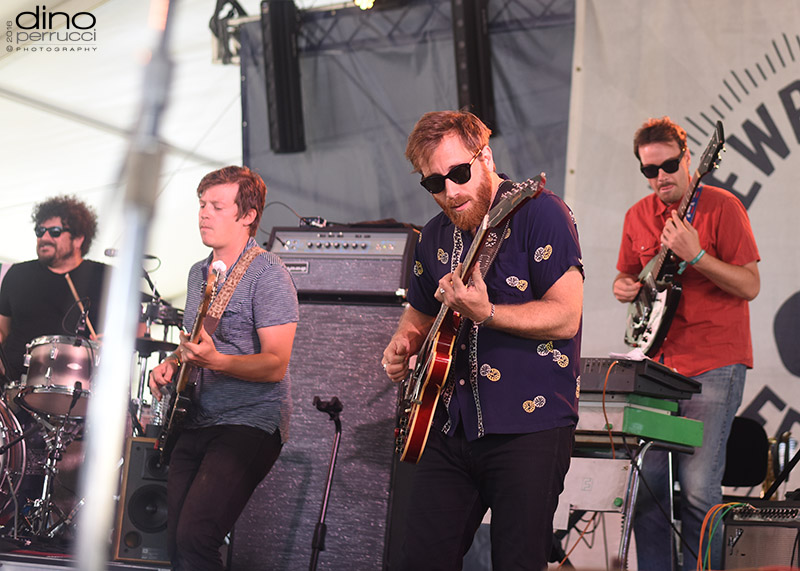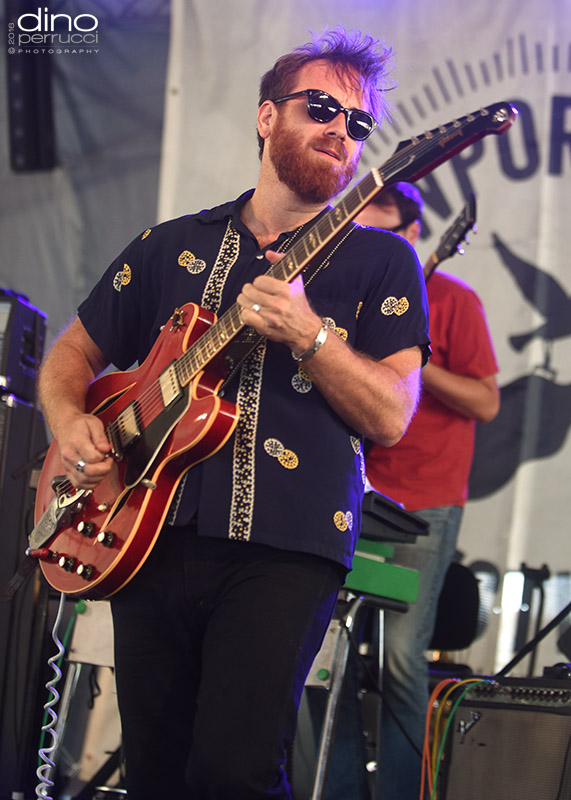Dan Auerbach Leads Nashville’s New Wrecking Crew
 Dan Auerbach has been ensnared by the album-tour loop for essentially his entire adulthood. So, in August 2016, after completing a run of shows with his garage-psych vehicle, The Arcs, the exhausted Black Keys frontman finally decided he’d earned a vacation. And he knew just the destination: the recording studio.
Dan Auerbach has been ensnared by the album-tour loop for essentially his entire adulthood. So, in August 2016, after completing a run of shows with his garage-psych vehicle, The Arcs, the exhausted Black Keys frontman finally decided he’d earned a vacation. And he knew just the destination: the recording studio.
“Now the hard work’s paying off, and I’m able to stay in the studio and take a break,” he reflects, seemingly unaware of how hilarious that statement reads on paper. “It’s been amazing.”
The Ohio-born Auerbach purchased his Nashville studio, Easy Eye Sound, after moving to the country-music capital in 2010. Though he’s utilized the facility to produce a handful of albums over the past seven years (including voodoo-rock legend Dr. John’s 2012 comeback LP, Locked Down), he didn’t fully explore the city until his recent unorthodox holiday.
So the 38-year-old musician did what any respectable singer-songwriter would do: He worked his local connections and, through a series of pivotal introductions, he assembled his own all-star session team. He wound up with his second solo LP, the breezy and soulful Waiting on a Song, and a complete creative rebirth that resonates beyond just an album. With his modern-day take on the Wrecking Crew, Auerbach is just getting rolling.
On this spring day, he’s cruising to the studio to work on numerous projects: overseeing final mixes of several albums for his new Easy Eye Sound label, rehearsing with collaborator Pat McLaughlin for an upcoming New York City show and preparing for whatever the hell else happens to pop up. That’s been Auerbach’s life recently—juggling multiple projects at once, flying by the seat of his pants. “What’s not going on there, man?” he says, chuckling in his quiet rasp. “Something. Something I gotta do.”
The key figure in Auerbach’s creative overhaul is Dave “Fergie” Ferguson, the veteran Nashville producer/engineer best known for collaborations with Johnny Cash and Sun Records alumnus “Cowboy” Jack Clement. They kindled their friendship after The Black Keys participated in a Ricky Nelson tribute album at Fergie’s studio several years ago. “He’s just always been around, basically,” Auerbach says. “He’s one of those guys. He’s got that ridiculous Southern ability to tell stories and just be social. He got my phone number the first time I met him, and we’ve been buddies ever since.” 
Fergie introduced Auerbach to some of the city’s most reputable session men and well-traveled songwriters, including: John Prine (and McLaughlin, his touring mandolin player), bassist Dave Roe, and guitarists Russ Pahl and Duane Eddy. He also introduced Auerbach to two of his current heroes: keyboardist Bobby Wood and drummer Gene Chrisman, former members of American Studios house band the Memphis Boys, who recorded tracks for artists like Elvis Presley, Neil Diamond and Aretha Franklin in the late ‘60s and early ‘70s.
Most of them had never even heard of Auerbach, let alone heard his music. Fergie recalls that he’d only “peripherally” stumbled on The Black Keys in movies or TV commercials—a fact that he confirmed after doing “a little Googlin’ and YouTube-in’.” But marquee names don’t matter to guys like this—only quality of musicianship. “Musically, I didn’t know much about Dan,” Fergie adds. “But I’ll tell you: He’s one of the finest singers and musicians I’ve ever known, and I’ve met a bunch of ‘em. He has a work ethic that would rival anybody’s.”
Fully immersed in Nashville’s elite music circle, Auerbach felt inspired to open his songwriting approach to outside collaboration. In a nod to his family’s bluegrass roots, he started hosting “pickin’ parties” at his house and frequented authentic local venues like the Station Inn. (“The first time we went to Nashville, when I was like 18, that’s where we went,” he says of the club, which has hosted artists like Bill Monroe and Dolly Parton. “It’s one of the main reasons I moved to Nashville—having places like that around. A place that caters to bluegrass, that was a big deal for me, having grown up in a bluegrass family.”)
He developed a full-blown creative itch after fiddling around with an old gut-string acoustic he hadn’t touched in several years. So he got down to business with a workmanlike weekly schedule: three days a week of writing with Fergie and McLaughlin, three days of recording with the full gang.
Huddled around with acoustic guitars, the writing trio worked for weeks, carving out dozens of songs. Auerbach wound up with around 200 in total, including seven cowrites with Prime, 40 with L. Russell Brown, 20 with Roger Cook and 20 with Wood. It’s quite a spread, especially since Waiting on a Song is only a 10-track LP.
Despite writing alongside legitimate Nashville legends— and giving direct writing feedback to a musician sitting feet away—Auerbach never felt awkward or intimidated.
“First of all, I’m from Akron,” he says. “There was nobody writing there. Then I moved to Nashville, and there are tons of writers in this town. But even then, I was touring most of the time—I wasn’t home. And when I got home, I wanted to be in the studio making music. It wasn’t until I made the conscious decision to stop touring that I was even open to the idea of doing songwriting sessions. This was the first time I’d done the process like that, in a more traditional way. But you have to put your faith in the other people a little bit. I instantly fell in line with it. I just loved the routine of it—every day, working that muscle.” 
But as Auerbach explains, writing a song is basically a cakewalk compared to recording one—and he was only satisfied when the “magic” presented itself. “I don’t write a song and think, ‘Shit, this one’s so good!” he says. “I’ll cut it, and it’ll suck. I’ll record it with the band, and it won’t work. You never really know what is going to be the thing. You have to write, then assemble the crew and record it. And then it has to come out great—you have to capture a magic moment. It’s so hard to pinpoint, you know what I mean? The more you do it, the more times you get lucky.”
The other 190 songs may never see the light of day, but they certainly got lucky with Waiting on a Song, which may feature the 10 sharpest songs of Auerbach’s career—from the twangy title track to the chugging folk sing-along of “Shine on Me” (featuring a guitar cameo from Dire Straits’ Mark Knopfler, recorded remotely and sent via email) to the tropical-tinged funk-pop of “Cherrybomb.” Ultimately, the “move to Nashville” backstory may be misleading: Propelled by his new band’s deft ability to tackle any style, Auberbach wound up with material that feels both vintage and slightly futuristic.
“It sounds new and old at the same time,” he says. “It’s exciting. Listening to you trying to describe it is awesome; You have to use so many descriptors.”
“It’s not what you’d expect,” Fergie adds. “But I think he was able to do a lot of recording with those guys and not sound like Nashville at all. I don’t think it sounds anything like Nashville. In fact, with those guys—Bobby Wood and Gene Chrisman, for sure— [Auerbach] made a conscious effort to de-Nashville-ize them and take them back to their soul roots. Because that’s where they started. So he’d work them up and say, ‘No, no, we don’t want that. We want the old stuff.’ Then he’d add his talents to it, and it really came to life. His arrangements are amazing. It’s surprising because you write a song and think of it one way, and then he finishes it, and it’s another animal.”
The best example of that eclecticism is “Waiting on a Song,” which Auerbach likens to a delicious collective cocktail. “If everyone in this group’s brains are oranges, then we just squeezed all the juice,” he says with a laugh. “Everyone’s personal history is in that song. The gospel Wurlitzer of Bobby Wood, the chicken pickin’ of Russ Pahl, the bluegrass harmonies I grew up with—everyone’s personality is in this song. That’s what I love about it.”
Despite having backed some of the most iconic singers of all time, Auerbach’s crew was always receptive to criticism— and always eager for a new challenge. After all, as session players, they were used to being undervalued. 
“You would think, because they’d been a part of these big records, that they just live high on this mountain and you can’t touch them,” Auerbach says. “But we all find out that’s not the case after watching every fucking documentary about every studio band that’s made all of the hits that we’ve bought and loved over the years. For all the amazing things that Gene and Bobby have played on, they just got paid session rates for that afternoon. They don’t get the kind of money [you’d expect] out of those songs, so they just have to continue to work. And when they get called to a session, that’s what they do. They’re session guys—even to this day. They were maybe just going to another session when they first came over to my place. But I think they quickly realized it was different at my place, and everyone loosened up pretty much immediately and got into it.
“And they loved [the experimentation of Waiting on a Song],” he continues. “Because if you think about what those guys have done their whole lives, they haven’t followed any rule book. Bobby Wood told me one time, in the Top 20 pop charts, they had 12 songs. He said at that moment in time, he wasn’t reading any trade magazines or listening to the radio. These guys are trendsetters, always pushing boundaries in pop music. How do you describe Neil Diamond’s ‘Sweet Caroline?’ What style of music is that? It’s a weird mixture of everything— gospel, folk, pop music. ‘Suspicious Minds’ by Elvis— what is that necessarily? I’m just continuing on a tradition of what these guys started. I’m learning from them; they’re learning from me.”
Auerbach is now accepted among Nashville’s elite, and he earned their respect in the studio as a confident producer. “I’ll make suggestions all day long,” he says. “I think it’s all in the way you say it, but I feel totally comfortable. I don’t know why, but I do. It’s funny—there’s audio of Bobby Wood from an Elvis rehearsal at American Studios. You hear Elvis singing, and somebody interrupts him and says, ‘No, no, Elvis. It goes like this.’ And they play it for him on the keyboard, and Elvis says, ‘Thank you very much, Bobby Wood.’ So somehow, as a young man, he had the balls to tell Elvis how to sing. I guess I figured out how to tell Bobby how to play. We’re both crazy.”
In May, he also had an opportunity to play with Del McCoury during the bluegrass architect’s annual DelFest in Cumberland, Md. Not only did they work through some classic covers, but McCoury and his steady band also performed a few of Auerbach’s tunes. “Just having the chance to play with the greatest living bluegrass player alive—I wasn’t going to say no,” says Auerbach, who has been jamming in Nashville with McCoury’s grandson Heaven. Fergie, who was also at the fest, adds, “I was amazed about how big the festival was and have total respect for Del. It was great to see Dan and Del play together—a real special moment.”
Auerbach’s studio paradise hasn’t faded either—in fact, having to promote Waiting on a Song is just a distraction from his Easy Eye Sound oasis. (Fergie’s still floating on “cloud nine,” he says, noting that his songwriting adventure shaped “one of the best summers [he’s] ever had.”) The Black Key talks about music-making like an illicit drug, and his dependency only deepens with each hit.
“The album is just a small chunk of what I’ve been up to,” he promises. “It’s a little glimpse. I can’t stay away from the studio. This whole experience—I feel like I’ve learned so much in the past year that it’s hard to put into words. We all can’t wait to get here. It’s not work. Everybody comes over just to listen to mixes and shit. It’s exciting. I really feel like I created a little universe here with these guys. The stars have aligned. That’s why I’m so addicted to the creation process here. I can’t stay away.”




















